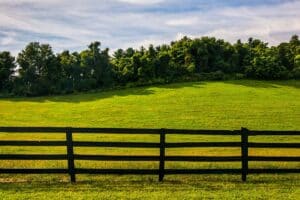As previously mentioned in Part 1 of this article, vacant land can have many different types of access, each with its own set of advantages and disadvantages. If there is no access to a piece of land, however, it is said to be landlocked and can only be reached by crossing over other private property.
Here, we’ll focus on how to establish access to landlocked property, confirming if a property has legally recorded access, and problems that may arise.
What’s The Difference Between Deeded and Undeeded Access?
If you are considering selling a landlocked property, establishing access to that property could mean the difference between a sale or no sale, or getting a decent offer vs. a bad offer (or no offer at all). On the other hand, if you’re interested in buying a landlocked property, you might want to negotiate directly with your neighbor to create a property easement.
Having access to a property, whether deeded or undeeded, can eliminate issues with using or developing the land while you own it and will benefit you on a future sale of the property. Landlocked property, or land with no legal access, is worth much less than a similar piece of land that does have proper legal access.
Deeded access refers to a legally established right-of-way or easement that is specifically described and recorded in the deeds or property records for a particular piece of land. This type of access is typically granted by the owner of the land and is considered a permanent and binding right.
Undeeded access refers to a right-of-way or easement that has not been specifically described or recorded in the property records. This type of access may be based on long-standing use, custom, or implied agreement, but it’s not necessarily a legal right. Undeeded access may be more difficult to prove or enforce in a court of law.
How Do I Get Deeded Access to My Property?
To get deeded access to a landlocked property, you will typically need to negotiate with the owner of the land whose property you want to access in order to get to yours. This may involve discussing your needs and the terms of the access, such as the location of the access point, the width of the access road, and any conditions or restrictions on the use of the access.
After reaching an accord with your prospective grantor, it’s best to get that agreement formalized, generally with the assistance of an attorney. This is typically done through the creation of a legal document known as an easement or right-of-way, which describes the terms of the access and is signed by both the landowner and the person seeking the access. Have the agreement signed by both parties and recorded at the county recorder’s office or assessor’s office; this will make the easement a matter of public record, ensuring that it’s legally binding.
It’s important to keep in mind that obtaining deeded access is a legal process, so it’s highly recommended to seek legal guidance from an attorney experienced in real estate law to help you navigate the process and ensure that the easement is properly recorded and enforceable.
Additionally, there may be zoning, building and other regulations and permits you need to comply with before you can establish the access, so it’s important to check with the local authorities.
How Do I Find Out if Access is Legally Recorded?
To find out if a landlocked property already has deeded access, you’ll want to check the property records for that specific piece of land to confirm that access has been legally recorded. These records are typically maintained by the county or municipality where the land is located.
You can check for recorded easements, rights-of-way or other property access agreements that would be listed on the property title. To access these records, you can start by searching the county’s public records online or visiting the county’s property records office. You will probably need to provide the property’s address or parcel number to retrieve the information.
You can also hire a title company or attorney to do a title search for you. They would look up the property records and provide you with a report that describes any recorded easements or rights of way for the property.
Can Someone Intentionally Block Access to My Property?
It is possible for someone to block access to your property if they own the land, or have an easement or right-of-way over the land, that provides access to your property. However, it’s generally illegal to block access to a property without a legal right to do so. If someone is blocking access to your property without a legal right to do so, you may be able to take legal action to have the obstruction removed.
If the person blocking access to your property has a legal right to do so, such as an easement or right-of-way, you may still be able to take action if they are using that right in an excessive or unreasonable manner.
It’s recommended to consult with an attorney experienced in real estate law to understand your rights and options, and help you navigate the legal process. Landlocked property can be a good investment opportunity but carries the risk of costly legal disputes. Obtaining legal advice and understanding your rights can help you avoid having to fight for legal access to your land.
Written by Felicia Cristofaro, co-founder and co-owner of Compass Land USA. For over 6 years, Compass Land USA has specialized in providing land buyers a safe and easy way to invest in rural and vacant land (especially in AZ, CO, FL, NM, AND NC!) and has helped over 250+ happy land buyers!
This content may not be used or reproduced in any manner whatsoever, in part or in whole, without written permission of LANDTHINK. Use of this content without permission is a violation of federal copyright law. The articles, posts, comments, opinions and information provided by LANDTHINK are for informational and research purposes only and DOES NOT substitute or coincide with the advice of an attorney, accountant, real estate broker or any other licensed real estate professional. LANDTHINK strongly advises visitors and readers to seek their own professional guidance and advice related to buying, investing in or selling real estate.










Add Comment